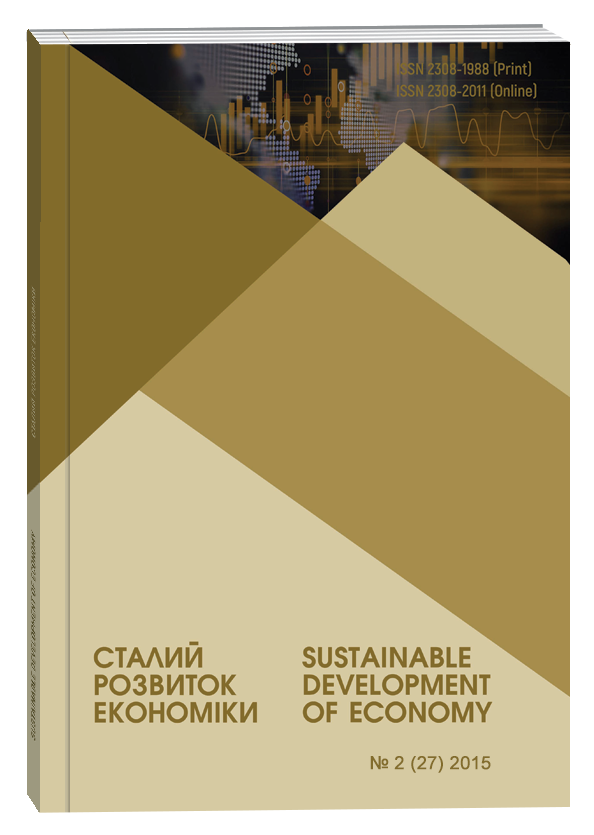TYPES OF TRANSBORDER ECONOMIES AND ITS IMPACT ON NATIONAL ECONOMIES IN THE LIGHT OF OFFICIAL STATISTICS
Анотація
The concept of transborder economy as special type of socio-economic systems in globalized world is defined. The differences between factors of development of national economies, regional economies and transborder economies are discussed: institutional, political, social, cultural and organizational differences of socio-economic phenomena and processes realized on the territories of different neighbouring national economies. The criteria of identification and delimitation of transborder economies are formulated. On this basis the typology of transborder economies (TE) is proposed. The following types of transborder economies are defined: (a) markets-based TE, (b) infrastructure-driven TE, (c) TE based on institutional complementarity, (d) TE based on common environmental resources, (e) TE based on socio- economic complementarity and substitution. Basic factors of development of transborder economies are analyzed, with special reference to the differences of potentials as basic stimuli of economic cooperation in transborder regions. Need of developing integrated information system of statistical information for a transborder economy is stressed. Main challenges and difficulties of producing integrated, comparable statistical information describing and monitoring transborder processes and resources are discussed. The cooperation of official statistical agencies operating in transborder areas is the prerequisite of effective economic and social policy and the foundation of activities of businesses in transborder economies. Transborder statistics should be considered as the specific domain of official statistics in globalized economy.
Посилання
Becker G., Human Capital: A theoretical and empirical analysis with special reference to Education. The University of Chicago Press, 1994.
Bresser R., Millonig K., Institutional capital competitive advantage in the light of neoinstitutionalism in organization theory, in: Schmalenbach Business Review u Vol. 55 u July 2003 u pp. 220–241
Hallsmith G., Lietaer B., Intentional Cities, Intentional Economies, Ch.3. Creating New Capital, www.neweconomictheory.org.
Hansen, W., Education, Income and Human Capital. 1970.
Khakee A., Assessing institutional capital building in local agenda 21 process in Goeteborg, Planning in Theory and Practice, 2002, Vol.3, No 1, 53-68, Roughage Ed.
Lasek D., Cierpial-Wolan M., Olenski J. (ed.), Foundations of transborder economics and statistics, Publ. Association of the Catpathian Euroregion, Rzeszow 2014.
North, D., Institutions, Institutional Change, and Economic Performance, Cambridge University Press, Cambridge, 1990.
Oliver, C. Sustainable competitive advantage: Combining institutional and resource-based views. Strategic Management Journal, 1997, Vol. 18, pp. 697-713, .
Olenski J., Infrastruktura informacyjna panstwa w globalnej gospodarce, Publ. Nowy Dziennik, Warszawa 2006.
Olenski J. Ekonomika informacji – podstawy, PWE, Warszawa 2000.
Paldom M., Social capital: one or more? Definitions and measuring. Journal of Economic Surveys, Vol. 14, No. 5, Blackwell Publ., 2000.
Platje, J. Institutional capital as a factor of sustainable development, The importance of institutional equilibrium, Baltic Journal on Sustainability, (2008), Vol. 14, n° 2, pp. 144-150.
Romer P., Human capital and growth: theory and evidence, NBER Working Paper No. 3173,
November 1989, NBER Program(s), www.nber.org
Ustich S., (ed): Efficiency of transborder cooperation via international monitoring and coordination of activities of national subjects, Serie: Geopolitics of Ukraine – history and modern times, Vol. 2011/5, Institute of Transborder Cooperation, Transcarpatian State University, Uzhorod 2011
Ustich S. (ed.), Ways to improve efficiency for transborder cooperation on the new eastern border of EU, Serie: Geopolitics of Ukraine – history and modern times, Vol. 2012/9 Institute of Transborder Cooperation, Transcarpatian State University, Uzhorod 2012.


